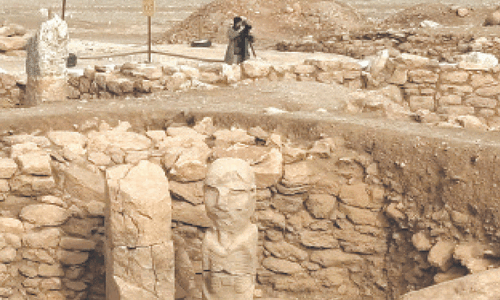BELFAST: Two decades after the Good Friday Agreement formally ended the conflict in Northern Ireland, the peace process remains fragile and Brexit is provoking concerns over its durability.
The accord, signed on April 10, 1998, by the British and Irish governments and local political parties, ended 30 years of unrest that had left more than 3,500 dead.
It came four years after the Irish Republican Army (IRA), which had waged a deadly campaign of bombings and shootings in Northern Ireland and mainland Britain against London’s rule on the island, declared a historic ceasefire.
“I have been a member of the Labour Party for 54 years and a parliamentarian for 32 years and nothing in my life has compared with 5.30 pm on Good Friday, April 10, 1998,” Paul Murphy, a British Foreign Office minister for Northern Ireland at the time, told reporters as the anniversary approached.
Since then violence by the IRA and unionist paramilitary groups fighting for continued British rule of the province, has receded.
But communities continue to be divided along sectarian lines and political tensions remain — most pointedly around devolved governance.
Northern Ireland has been without an executive for 15 months after a power-sharing administration between the Democratic Unionist Party (DUP) and nationalist party Sinn Fein, in place since 2007, collapsed acrimoniously.
“A lot of people are wondering really how much has Northern Ireland changed in 20 years if the communities are so divided,” said Siobhan Fenton, author of the forthcoming book The Good Friday Agreement.
‘Chuckle Brothers’
Former Ulster Unionist Party leader Mike Nesbitt believes power-sharing in Belfast has been successful for “only one year” — when Ian Paisley, of the DUP, and one-time IRA commander Martin McGuinness, of Sinn Fein, ruled together through 2007.
“[They] got on so well they became known as the Chuckle Brothers,” he said. “These two old enemies came together and... put a smile on their face and they made the effort to get along.”
The accord, reflecting “the unique nature of Northern Ireland”, was not intended to be “a one-off agreement”, according to Fenton.
Instead, “it has to be constantly updated to respond to the different events and social changes in society”.
Others have been more sceptical from the outset of the agreement.
“If the agreement was perfect, we wouldn’t have the crisis we actually have in Stormont,” said Ian Paisley Jr, a DUP lawmaker in Westminster.
The DUP was the only major political group in Northern Ireland to oppose the deal in 1998, citing too many concessions to nationalists.
Giada Lagana, a political science academic at the National University of Ireland Galway, told AFP the deal was an “ingenious compromise where everything is subject to interpretation”.
However, its interpretive nature has led to recurring disagreements over certain key provisions.
Britain’s domestic politics has also complicated the picture.
Conservative Prime Minister Theresa May’s minority government remains in power only with the support of 10 Westminster lawmakers with the fervently pro-Brexit DUP, sparking fears over their influence.
Unification poll ‘up in lights’
The impact of Britain’s impending departure from the European Union on Northern Ireland has many worried, particularly because of the prospect of the return of a physical border with the Republic of Ireland, an EU member.
New Sinn Fein leader Mary Lou McDonald told reporters in London in February that Brexit was “not compatible” with the agreement.
Brexit will also result in the loss of a key channel for dialogue among peace process stakeholders, according to Lagana.
“The only place where this common approach has always been possible was within the European institutions,” she said.
For nationalists, a referendum on the reunification of Ireland — called for under the accord only once there are signs of majority support — would be the preferred way to solve the border issue.
McDonald, who said Brexit had put the poll option “up in lights”, predicted it would happen within a decade.
But for now, it lacks the necessary support across Northern Ireland’s still-fractured society.
Published in Dawn, April 10th, 2018

































